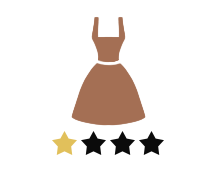wrote:
Title, cover, synopsis
So, this is mainly my own opinion and depends on what "look" you want for your story. I personally try to aim for it somewhat more professional, so if it was up to me, I'd change the title, remove the stars, and use capital letters where it is due. I would also add a proper synopsis for the story because "simply a story about [...]" is not winning much attention. It looks like a hobby project, and maybe that's what it is, but you still may not want it to appear like that -- readers want to know that this story is a) going to entertain them and b) going to be completed (even if it may take a small eternity.)
However, I do know and understand that there are genres of aesthetics that are popular within Wattpad, so this depends on what and how you want your story to be perceived by others. I think it's worth giving a thought. I would also extend that consideration to all the chapters before the real first chapter. You will hook someone with it and you will lose someone by it based on people's preferences. Since the story is brand new, settling characters as "persons" without them having been officially introduced in the story yet is sorta a "no" for me, but, again, people are different. Anyways, whatever you end up with, keep it throughout the whole book.
I think the warning part is good. (It also looks really aesthetically pleasing, it was satisfying to see and read, haha.)
Chapter one
* So my first thought is that the first line is interesting, but it's also not keeping me interested until you're done explaining the whole definition and perception of a lie. I notice that you aim to insert the main character into that thought, but for me, there's a problem because the definition reads more as an essay and I don't think that's the same way Elizabeth would have thought. When she first comes to play, she feels distant from what has been said beforehand. I think that can be solved by some more revising.
* Starting sentences with "And" and "But" is grammatically incorrect. It's an easy way out and works in speech, but in writing, you will want to make them as few as you can. Instead of using but try to explore a little more in-depth about what she is thinking and what her actions are and how you can make them fit together more smoothly.
* Show, not tell! This is the everlasting advice that is incredibly much harder to do than you think and at least for me, is just such an effort to get down all the time. Regardless, you want to show more of what your character is doing and how it is reacting and thinking and not only TELL us everything. We want to be in the action with her, not being told what she thinks. We want to know that thought when she thinks it. I think a lot of telling is perfectly fine in early editions and drafts because they help you write down the story in the first place, but when you come to revise and edit a lot of those will have to go because an overload of it does not really make the best storytelling. You can and should tell some things, but most should be shown. Example:
> So what I try to ask myself to change it up is ''how can I draw the reader into this situation?' What does she sees, what's going on (what's the action and reactions), how is she feeling (describe it!), what are the smells, and so on. So when you aim to say that she feels stagnant, paranoia and like she always has to hide, then ask yourself how this comes out in her conversations with others BUT present it through her body language in situations she's in. Does she put on a fake smile, does she says "just kidding?" etc. Yes, she does that, but instead of telling the reader that that's her normal behavior, put her in a situation where she has to actively USE that to SHOW us this is how she reacts. You can try thinking about it like you were watching a movie: are you seeing the characters do these things and reactions and picking up on them as the story grows or are you being told them? (some you are being told, but most are in-between the lines and shown.) The same way you may want to show us that her parents are arguing and not just telling us. Like, let us follow her on her way home to school when she comes home or over a weekend where she does her stuff but also has to listen to them arguing. Or that there's early and the sun shines in or there's dark and she feels shitty for having to wake so early, etc.
* Filler words \ uneccessary words. My favorite is writing "like" at everything, but truth be told it does not make it good in a story when it is a word that isn't strictly needed to convey what's being said, add voice\atmosphere\feelings\thoughts. So take a double check and see if some words are just fillers. It may be comfortable to use them when you draft because you feel insecure about what's being said or something, but they shouldn't stay beyond that. You - the author - can feel incredibly insecure about what you're writing, but it should not be in your work because your work is not your experience writing it.
* Change in perspective. You change perspective from third person (she\her\name) to first person (I). You need to be consistent with the narration and pick one and keep it all the way. I know it's easy to mix it up though. I do that all the time as well, especially when I start writing thoughts but keep an eye out for it either while you write or when you go over and edit it to keep the same pronouns all the way.
* So plot-wise? This one may be the harshest, but I could consider which type of beginnings are cliche (overused) and how you at least can tweak them to make them more interesting. Since you're writing contemporary, consider what of all the normal behavior is important but also which of it is dead-ass-boring for the reader to read.
* As a first chapter and me, as the reader: Am I grabbed? There's something interesting about it. The opening part about lies does introduce an element that interests me, but it's still far too early for me to say if I will stay with it since I know very little about the plot thus far. I know her a) parents are arguing, b) she's hiding for some reason, and c) she does not like drama nor schools as an institution which probably relates back to her feeling outside of everything that's going on since she has to hide all the time. So you clearly have stakes to play on that can make the story really interesting.
So generally, just revise it a few times and it will probably improve a lot! Add a proper synopsis as well. It's after all, one of the first impressions the reader gets when picking up your book so it should grab your reader.



 0
0 0
0 0
0 0
0 To join the forums you need to be logged in.
To join the forums you need to be logged in.














 13
13
